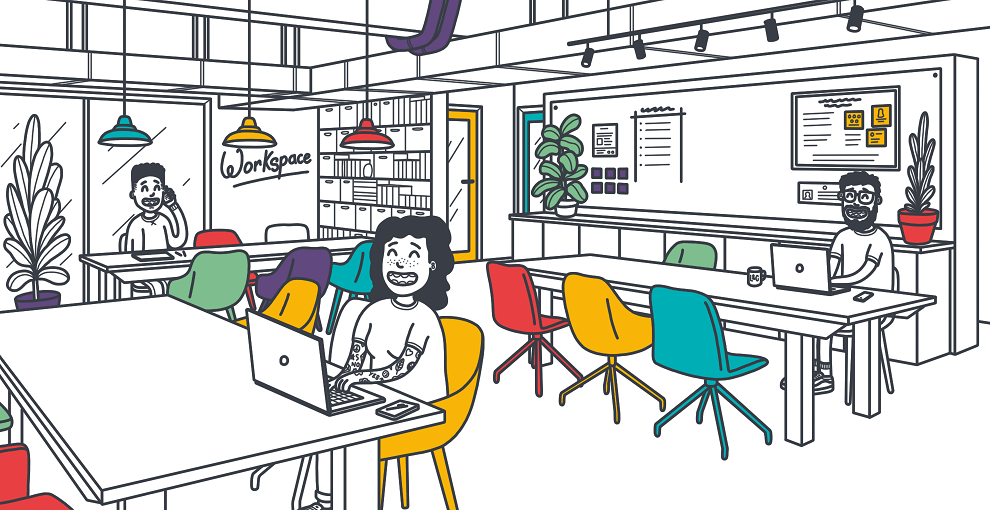Be honest. What’s your bookkeeping setup like? Or in simpler terms, how do you keep track of the finances for your small business?
It’s pretty common for bookkeeping to sit right at the bottom of the list when businesses are starting up. You need to bring in some money first, then you can worry about the bookkeeping, right?
Lots of businesses scrabble around when that first customer needs to be invoiced, and end up cobbling something together as a PDF. Most also realise fairly early on that they need to keep their receipts. In the early days, it’s common to see your bookkeeping as a job to get to grips with once a year when tax return time looms.
This is the position a lot of businesses are in when they first come to me. You realise your business is growing and you need to look after your finances more regularly. So, what are your options?
Can I use a spreadsheet for my bookkeeping?
Yes – for a brand new business, when finances are relatively simple, Excel or another spreadsheet is totally up to the job. It’s a cheap option (excellent for those early days when your income and cash flow can fluctuate wildly), and it means you can keep track of your income and your expenses.
As your business becomes more established, you’ll probably find it’s time to move to something a bit more sophisticated. Spreadsheets can be unreliable. They can easily get muddled or save incorrectly. And don’t get me started on the chaos that can follow a formula getting corrupted…
The way you use your spreadsheets might be useful to inform what you want from any software you look at. How often do you look at your spreadsheets? What kind of information are you interested in from them? What jobs would you like to automate? All these things can help you make a better choice when it comes to deciding on a software package.
What about Making Tax Digital (MTD)?
There’s been a lot of talk about Making Tax Digital meaning that you’ll will need to use a software tool to submit quarterly profit statements to HMRC. But (and here’s the fun part), even though the deadline is approaching, nobody knows exactly what this is going to look like yet. Not all businesses will be affected immediately, and we don’t know which software will be compatible. It’s highly likely that the big names like Xero will be but some of the smaller and non-UK based ones such as VT and Wave may not. All in all, I’d say it looks like you will need to move to some kind of software in the longer term for Making Tax Digital, but not yet.
I want to move on from Excel but I don’t feel quite ready for accounting software. Are there any other options?
There are always options. You might want to look at something like 1-Tap, to give you a helping hand and get you in the habit of looking at your finances regularly. With this kind of app you take photos of your expense receipts and it turns them into digital copies, with a running total of what you’re spending. 1-Tap are rolling this out to cover sales invoices soon, too, which could make it a good software introduction if you are not ready, or do not need, a full accountancy software package just yet.
I don’t know where to start. What software would you recommend?
Well, I use Xero so I think that’s an excellent place to start! It’s very user-friendly and it’s really flexible so it can grow with your business. It also links to lots of other software options, which mean that you can almost custom-design a software package that suits you and your business needs.
BUT, it can be expensive, especially when you start customising. Accountants who use Xero (like me!) can offer a cash-flow version of the software, which is much more affordable, so it’s worth asking around.
Is there anything cheaper?
There are loads of options out there, which means that prices can be very competitive as all the different suppliers jostle for your business. Kashflow, FreeAgent and ClearBooks all have affordable options that can work for freelancers. QuickBooks Online (QBO) and SAGE One have graded options, like Xero does, so that you can start on a cheaper version and then build up as your business grows.
There are also a couple of free options from Pandle and Wave. Keep in mind, though, that Wave is American so it doesn’t deal with UK VAT very well, and it may not be ready for Making Tax Digital when the time comes.
How do I get started?
The best thing to do, as with many things in life, is to ask around and have a play with some of the options. It might be useful to have a chat with other businesses you know to see what they use, particularly if they’re in the same line of work or have a similar-sized business. They’ll give you an honest review of the good and the bad. It’s also worth asking your accountant, if you have one.
You can usually take a free trial of the software so pick a few that you like the look of and have a play with them. You might find one more intuitive than another, and it’ll give you some more idea of what you do and don’t like, which will help in your research.
And finally…
Once you’re ready to get started, there’s often free online training with accounting software so learn how to use it, and what it can do for you. There are also courses you can pay to go on, or accountants like myself who offer training, if you want a bit more help.






